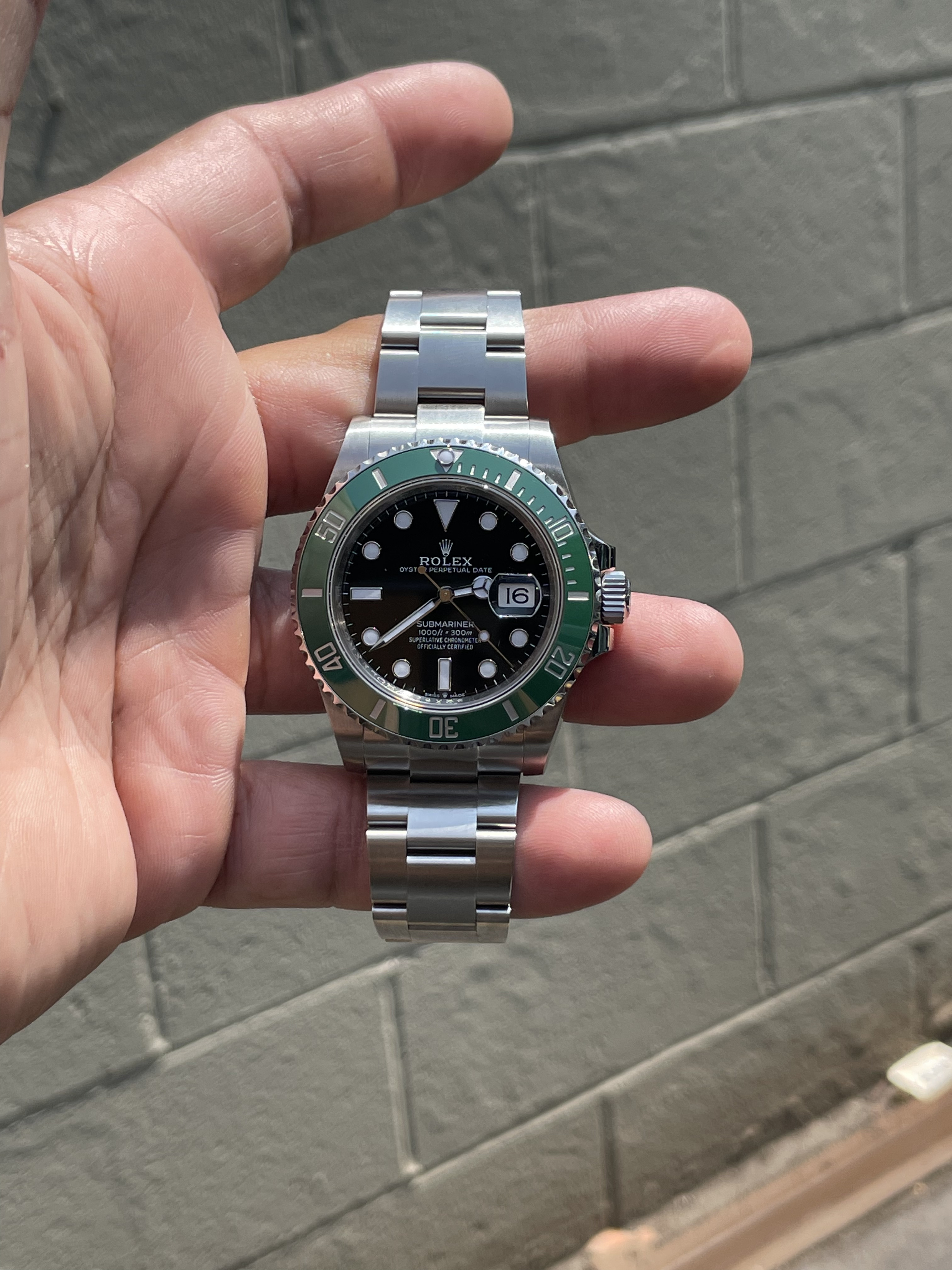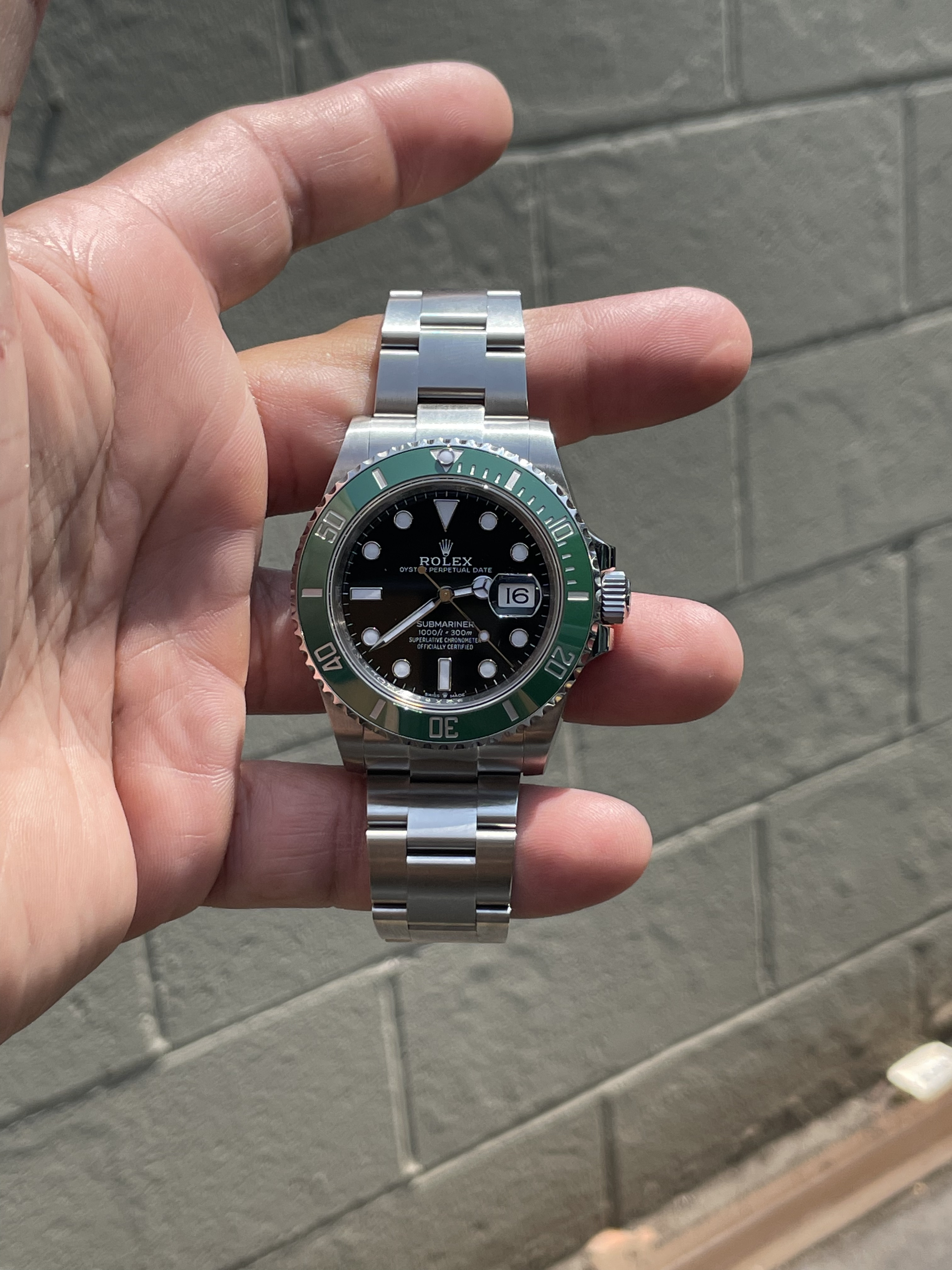-
Tired of adverts on RWI? - Subscribe by clicking HERE and PMing Trailboss for instructions and they will magically go away!
You are using an out of date browser. It may not display this or other websites correctly.
You should upgrade or use an alternative browser.
You should upgrade or use an alternative browser.
RAIDS happening - message from reddit dealer
- Thread starter Repmaster1337
- Start date
mlk2000m0
Getting To Know The Place
- 9/5/20
- 34
- 18
- 8
That's it why?
If you're dealing with a trusted dealer, they will refund your crypto payment as well!
Correct me if I’m wrong, doesn’t paying with crypto mean you cannot be refunded by TD’s?
Ylijumala
Active Member
You're wrong.Correct me if I’m wrong
Source: Wristwatchspot.com
Now, good news is V6 and VS factory just back to work, but only for several days, to deal with their old stocks, so at this time, some Panerai models are available, such as PAM 441 and 438, the stainless steel Ballon Bleu 42mm from V6 factory is also available, once being sold out, I do not know how long to wait because these two factories may not accept orders, so you need to wait for their next return. About Noob, there is still no news about them, but some dealers claimed that they can still get watches such as Daytona from Noob, be careful, this is not real, do not be scammed.
Now, good news is V6 and VS factory just back to work, but only for several days, to deal with their old stocks, so at this time, some Panerai models are available, such as PAM 441 and 438, the stainless steel Ballon Bleu 42mm from V6 factory is also available, once being sold out, I do not know how long to wait because these two factories may not accept orders, so you need to wait for their next return. About Noob, there is still no news about them, but some dealers claimed that they can still get watches such as Daytona from Noob, be careful, this is not real, do not be scammed.
About Noob, there is still no news about them, but some dealers claimed that they can still get watches such as Daytona from Noob, be careful, this is not real, do not be scammed.
No Dealer that is a TRUSTED DEALER here in the forum does this.
Stick to them and get better Service then fucking amazon.
- 20/2/14
- 471
- 222
- 43
Interesting article today from https://www.worldtrademarkreview.com...ories-in-china
Copied below in full.
“Nothing has changed” – concern over stalled efforts to close counterfeit factories in China
Last month, a leaked message from WuWatch (a China-based website outlet for fake watches) was published on Reddit claiming there have been “more police raids in China”. In the message, a WuWatch representative claimed that legal authorities “always raid recently”, and revealed that a factory operated by ‘Noob’, a notorious producer of fake watches, had been shut down. In further conversations, the WuWatch rep reportedly claimed “more raids are shutting down rep factories”.
Unsurprisingly, there is concern and outcry in communities dedicated to ‘rep culture’, especially those who regularly buy fake luxury watches. Some are speculating on the reasons for a crackdown, with one claim that Chinese authorities have been ordered to “clean up shop” prior to the upcoming Winter Olympics in February 2022. Others are not worried, claiming that raids are usually a temporary measure until counterfeiters move to another site. “For people worrying about the future of replica watches, there's nothing to worry about,” one user claimed. “Everybody in China knows about the rep industry, and the government doesn't have an initiative to stop this booming industry.”
While the ‘rep community’ is reporting a significant increase in police raids, experts on the ground are more sceptical. A representative from Chinese IP law firm Ferrante IP says they “have not seen any significant increase in the number of counterfeit-related factories being closed over the past year”, adding: “Indeed, quite a few small factories involved in counterfeiting have been closed, but it is more due to the economic and social challenges caused by pandemic, rather than additional attention from the enforcement officials specifically.”
That is not to say that there’s been a step back in enforcement activity from Chinese enforcement agencies, the firm representative clarified. What helps, they note, is “continuously enhanced new laws and specific regulations pertaining to enforcements” that have been enacted in the last few years. In general, they’ve further noticed that “small-scale unnamed factories” are more likely to be permanently closed, most of which are located in Guangdong and Zhejiang provinces.
In another conversation, a prominent counterfeiting expert in China (who preferred not to be named for safety reasons) clarified that, despite rumours of a recent crackdown, “nothing has changed”. Indeed, they have noticed that counterfeit factory raids in China “are somewhat cyclical in nature” and “tend to take place in the run up to Chinese New Year, where rep production ramps up due to everything in China closing down for over a month”. From their perspective, the legal authorities in China could do more, but there’s little evidence that it is being done. “Factory raids seem to be more of a ‘box ticker’ for the higher-ups than an actual concerted effort,” the expert adds. “They clearly have the manpower to shut these places down should they so wish. However, given the scale of the business and the tax revenue, I’ve wondered if that would be in anyone’s interest.”
Of course, the mass closure of counterfeit factories would be in the interest of international brand owners, especially those in the fashion, luxury and pharmaceutical sectors.
In more positive news for rights holders, the expert tells us a recent popular product has been causing problems for manufacturers of fake goods. “With the introduction of the new ‘Air Jordan 1’ silhouette, the factories in Quanzhou – where the vast majority of Alibaba ‘customs’ originate – are in a bit of bother,” he reveals. “These factories predominantly worked on ‘Air Jordan 1 Highs’ and ‘SB Dunks’. Previously, they were able to play with the silhouette and only avoid using Nike’s Swoosh, but now they must change at least 30% of the shoe’s overall design – they are very wary of being shut down in that city. That is unlike neighboring city Putian, where the straight up replicas are produced, where the factories are more brazen.”
It’s clear from recent reports that the production of counterfeits in China has not been dented by the covid-19 pandemic or any other recent events. For brand owners, then, the fight continues.
Copied below in full.
“Nothing has changed” – concern over stalled efforts to close counterfeit factories in China
- Social media reports point to recent counterfeits crackdown in China
- Experts tells WTR they’ve seen little evidence of an increase in factory closures
- Guangdong and Zhejiang provinces most likely to see enforcement action
Last month, a leaked message from WuWatch (a China-based website outlet for fake watches) was published on Reddit claiming there have been “more police raids in China”. In the message, a WuWatch representative claimed that legal authorities “always raid recently”, and revealed that a factory operated by ‘Noob’, a notorious producer of fake watches, had been shut down. In further conversations, the WuWatch rep reportedly claimed “more raids are shutting down rep factories”.
Unsurprisingly, there is concern and outcry in communities dedicated to ‘rep culture’, especially those who regularly buy fake luxury watches. Some are speculating on the reasons for a crackdown, with one claim that Chinese authorities have been ordered to “clean up shop” prior to the upcoming Winter Olympics in February 2022. Others are not worried, claiming that raids are usually a temporary measure until counterfeiters move to another site. “For people worrying about the future of replica watches, there's nothing to worry about,” one user claimed. “Everybody in China knows about the rep industry, and the government doesn't have an initiative to stop this booming industry.”
While the ‘rep community’ is reporting a significant increase in police raids, experts on the ground are more sceptical. A representative from Chinese IP law firm Ferrante IP says they “have not seen any significant increase in the number of counterfeit-related factories being closed over the past year”, adding: “Indeed, quite a few small factories involved in counterfeiting have been closed, but it is more due to the economic and social challenges caused by pandemic, rather than additional attention from the enforcement officials specifically.”
That is not to say that there’s been a step back in enforcement activity from Chinese enforcement agencies, the firm representative clarified. What helps, they note, is “continuously enhanced new laws and specific regulations pertaining to enforcements” that have been enacted in the last few years. In general, they’ve further noticed that “small-scale unnamed factories” are more likely to be permanently closed, most of which are located in Guangdong and Zhejiang provinces.
In another conversation, a prominent counterfeiting expert in China (who preferred not to be named for safety reasons) clarified that, despite rumours of a recent crackdown, “nothing has changed”. Indeed, they have noticed that counterfeit factory raids in China “are somewhat cyclical in nature” and “tend to take place in the run up to Chinese New Year, where rep production ramps up due to everything in China closing down for over a month”. From their perspective, the legal authorities in China could do more, but there’s little evidence that it is being done. “Factory raids seem to be more of a ‘box ticker’ for the higher-ups than an actual concerted effort,” the expert adds. “They clearly have the manpower to shut these places down should they so wish. However, given the scale of the business and the tax revenue, I’ve wondered if that would be in anyone’s interest.”
Of course, the mass closure of counterfeit factories would be in the interest of international brand owners, especially those in the fashion, luxury and pharmaceutical sectors.
In more positive news for rights holders, the expert tells us a recent popular product has been causing problems for manufacturers of fake goods. “With the introduction of the new ‘Air Jordan 1’ silhouette, the factories in Quanzhou – where the vast majority of Alibaba ‘customs’ originate – are in a bit of bother,” he reveals. “These factories predominantly worked on ‘Air Jordan 1 Highs’ and ‘SB Dunks’. Previously, they were able to play with the silhouette and only avoid using Nike’s Swoosh, but now they must change at least 30% of the shoe’s overall design – they are very wary of being shut down in that city. That is unlike neighboring city Putian, where the straight up replicas are produced, where the factories are more brazen.”
It’s clear from recent reports that the production of counterfeits in China has not been dented by the covid-19 pandemic or any other recent events. For brand owners, then, the fight continues.
Last edited:
gilrob
Legendary Member
^
Most probably the closes to the truth so far. Thanks zachsdad82 for sharing the article.
Most probably the closes to the truth so far. Thanks zachsdad82 for sharing the article.
SuperLory
Well-Known Repist
- 22/10/15
- 8,505
- 5,118
- 113
the moment when a forum member "assures something".
Not a personal attack, but I simply doubt it.
It's just the internet. But I give everyone a Daytona from Noob who gets one.
You can find them even on reddit if you dont want to go down the rabbit hole of chinese apps. I’m not saying someone is producing noob daytonas, I’m saying there are noob daytonas for sale. That is a fact easily verifiable not my opinion or worse a boutade
Alan Bourdillion Traherne
Renowned Member
You can find them even on reddit if you dont want to go down the rabbit hole of chinese apps. I’m not saying someone is producing noob daytonas, I’m saying there are noob daytonas for sale. That is a fact easily verifiable not my opinion or worse a boutade
Heh. A replica replica Daytona.
You can find them even on reddit if you dont want to go down the rabbit hole of chinese apps. I’m not saying someone is producing noob daytonas, I’m saying there are noob daytonas for sale. That is a fact easily verifiable not my opinion or worse a boutade
I can google you a v4 Noob Picture and you can paypal me 900 usd. I "really have it" on stock.
Interesting article today from https://www.worldtrademarkreview.com...ories-in-china
Copied below in full.
Finally a useful post, a somewhat "official" one. Thanks for sharing!
Purchased a vsf 126610lv from trusty on 7/1, approved qc on 7/4 and it just arrived. Excellent post raid quality. As good as my other 2 vsf
Of course it is the same quality. These are just old stocks produced before the raids.
From wristwatchspot.com
“Now, most watches factories have been back to work, their business back to normal, but not all of them can ship watches out immediately, usually you need to wait for several days. For some models like Rolex GMT-Master II, you need to wait longer. Now shipping replica watches abroad is harder than before, the main issue is the delivery time, which will take much longer than before. The only shipping method now is EMS, sometimes packages shipped by EMS will be returned by the customs because of security, but packages will finally pass through the customs successfully, the only problem is that the wholesale process will take some days. However, we can still ship watches to USA and all European countries.”
“Now, most watches factories have been back to work, their business back to normal, but not all of them can ship watches out immediately, usually you need to wait for several days. For some models like Rolex GMT-Master II, you need to wait longer. Now shipping replica watches abroad is harder than before, the main issue is the delivery time, which will take much longer than before. The only shipping method now is EMS, sometimes packages shipped by EMS will be returned by the customs because of security, but packages will finally pass through the customs successfully, the only problem is that the wholesale process will take some days. However, we can still ship watches to USA and all European countries.”



